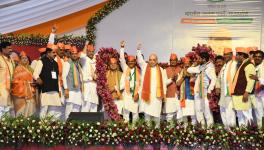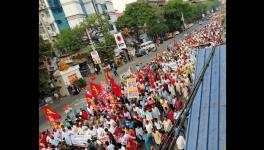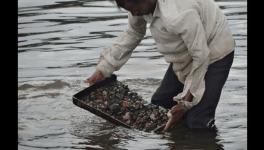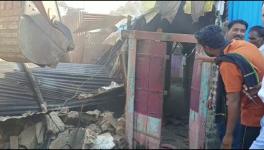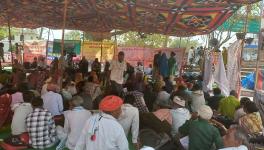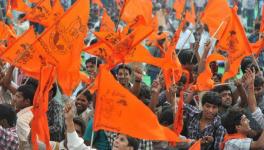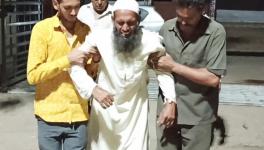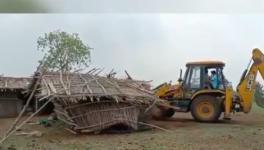Madhya Pradesh Village Tribals Without Land Titles for 4 Decades

A farmer and his wife till their land in Shukrawasa village, Dewas district, Madhya Pradesh.
As India ‘entered’ the ‘Amrit Kaal’ and celebrates Azadi Ka Amrit Mahotsav, a tribal majority village in Bharatiya Janata Party (BJP)-ruled Madhya Pradesh has been awaiting land ownership papers for the last 40 years.
Dewas district’s Shukrawasa village has a population of around 1,200 with Bhils, Bhilalas and Gonds constituting around 70% and the Khati landlord community the rest. The Khatis hold the maximum land in the village, according to the tribals.
A majority of the tribal population are migrants who arrived from Jhabua district 40 years ago and are engaged in agriculture and non-skilled labour in the nearest city Indore. Most of the tribals don’t possess land ownership papers despite paying Tozi, the annual tax for agricultural land. According to the rules of any state, a person paying land tax and getting a receipt in his/her name should be provided land ownership papers.
“Every time I enquire about my land ownership papers, the sahayak sachiv (a government employee) says it is being prepared. We have also met our sarpanch but to no avail,”
said Hari Singh, a man in his sixties mentioning his plight. Fellow villagers nodded in response to Singh.
Another villager Narsingh Dawra alleges that the Khati community uses its money and power to deprive them of land ownership papers. “Only a Khati is elected sarpanch from Parvatpura Panchayat (which includes seven villages, including Shukrawasa) because they are rich and powerful. They can bribe officials and I think this is the main reason for us not getting our land ownership documents.”
Journalist Sourav Banerjee, who founded How Ought We Live (HOWL)—a self-funded organisation providing education and health facilities to the tribals and making them aware of their rights like reservation, government schemes, etc.—said that when the tribals arrived, they cleared forestland and made it cultivable.

HOWL is a self-funded organisation providing education and health facilities to the tribals and making them aware of their rights like reservation, government schemes.
“Due to the lack of awareness, the tribals never launched a land movement and didn’t dare to protest the dominant landlord community. Several of them don’t even know how to file Tozi. A revenue department employee collects the tax from them and I doubt that some of them are provided fake receipts because they can’t read or write,” Banerjee said.
The journalist fears that the “tribals could be evicted without compensation anytime, in case, of an upcoming private or public infrastructure project because they don’t have land papers”.
Banerjee, like other villagers, also alleged collusion between the Khatis and government officials in not providing land documents to the tribals. “The landlord community has forcefully occupied the land of several tribals.”
The tribals also lack proper education, health, electricity and roads because of corruption. “The village has one primary school with only one teacher and is open for merely two hours. And in place of the appointed teacher, his brother teaches. Even the mid-day meals are not properly served with the teacher nicking the ration,” HOWL member Sandeep said.
Shukrawasa has around 70 houses and only a few families have benefited from the Pradhan Mantri Aawas Yojna with the rest having mud dwellings. They have no option but to remain satisfied with their mud houses since they don’t know the process to avail the benefits of government schemes except for pleading to the sarpanch.
Most of the tribals don’t have MGNREGA cards and aren’t even aware of the scheme. According to another HOWL member Tashiv, “Corruption is rife in the Parvatpura Panchayat. MGNREGA funds totalling Rs 20-Rs 30 lakh are duly delivered to the panchayat but not a single villager was employed in the last 10 years. Most of the work is done using machines.”
Kamal (40) said that most of the tribal youths are employed as labourers in Gujarat because their “small land holdings aren’t enough for survival and every family is indebted”.
The writer is a freelance journalist.
Get the latest reports & analysis with people's perspective on Protests, movements & deep analytical videos, discussions of the current affairs in your Telegram app. Subscribe to NewsClick's Telegram channel & get Real-Time updates on stories, as they get published on our website.









